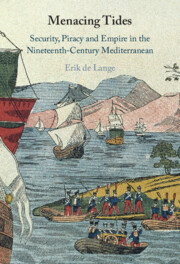
-
Select format
-
- Publisher:
- Cambridge University Press
- Publication date:
- 11 April 2024
- 18 April 2024
- ISBN:
- 9781009364126
- 9781009364140
- 9781009364119
- Dimensions:
- (229 x 152 mm)
- Weight & Pages:
- 0.643kg, 346 Pages
- Dimensions:
- (229 x 152 mm)
- Weight & Pages:
- 0.501kg, 346 Pages
You may already have access via personal or institutional login
Book description
New ideas of security spelled the end of piracy on the Mediterranean Sea during the nineteenth century. As European states ended their military conflicts and privateering wars against one another, they turned their attention to the 'Barbary pirates' of Algiers, Tunis and Tripoli. Naval commanders, diplomats, merchant lobbies and activists cooperated for the first time against this shared threat. Together, they installed a new order of security at sea. Drawing on European and Ottoman archival records – from diplomatic correspondence and naval journals to songs, poems and pamphlets – Erik de Lange explores how security was used in the nineteenth century to legitimise the repression of piracy. This repression brought European imperial expansionism and colonial rule to North Africa. By highlighting the crucial role of security within international relations, Menacing Tides demonstrates how European cooperation against shared threats remade the Mediterranean and unleashed a new form of collaborative imperialism.
Reviews
‘Menacing Tides exposes the extraordinary politics that took place on the high seas of imperial competition through the 19th century. Erik de Lange offers us a thick revelatory history of the Mediterranean as a critical site in the negotiation and transformation of the modern international order.’
Glenda Sluga - European University Institute
‘This deeply researched and engrossing account of the diplomacy and warfare surrounding the Barbary corsairs in the years after Napoleon highlights both individual actions and larger global contexts. The book offers much for debates about the interrelationships between the rise of multilateral diplomacy, humanitarianism, and Western imperial expansion.’
Brian Vick - Emory University
‘Erik De Lange’s elegantly written book is an ‘entangled’ history of cross-cultural encounters between North African ‘corsairs’ and Europeans in the Mediterranean in the era after the Napoleonic Wars. He demonstrates convincingly that there was a close link between the new European security culture which included the regulation of the High Seas, the fight against piracy, and the rise of intercultural violence and imperial expansion along the Mediterranean, which resulted in a true clash of civilizations.’
Matthias Schulz - University of Geneva
Contents
Metrics
Altmetric attention score
Full text views
Full text views help Loading metrics...
Loading metrics...
* Views captured on Cambridge Core between #date#. This data will be updated every 24 hours.
Usage data cannot currently be displayed.
Accessibility standard: Unknown
Why this information is here
This section outlines the accessibility features of this content - including support for screen readers, full keyboard navigation and high-contrast display options. This may not be relevant for you.
Accessibility Information
Accessibility compliance for the PDF of this book is currently unknown and may be updated in the future.


